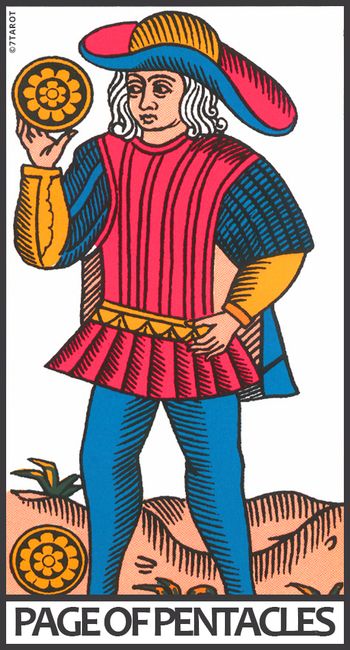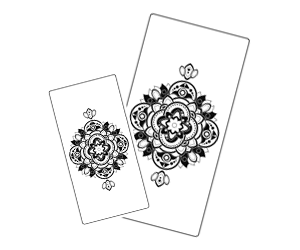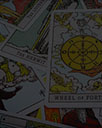Page of Pentacles tarot card meaning
-

-
UPRIGHT
planning, elaboration, materiality, wealth, determination,
REVERSED
accumulation, egoism, stagnation, waste, carelessness,
Unlike the Page of Swords, for example, the Page of Pentacles is generally viewed in the same way by all the followers of the Tarot. The announcer of good news, closely associated with the seeker's material success, this card is rightly considered a good omen. So, without further delay, I'm going to analyze the card's symbolic elements.
Simple in appearance, the card depicts an elegantly dressed young man who seems to be in his twenties, a characteristic common to all the Page cards. The character's feet are placed firmly on the ground, a posture that testifies to its down-to-earth character and its perfect acceptance of the laws of society.
With a fixed and focused look, the Page of Pentacles is carefully scrutinizing a coin he is holding in front of his face. In the world of cartomancy, the coin is an extremely powerful symbol, which bears witness to the tangible result of an action. It conveys the idea of completion, concretization, success.
Still immature, the Page of Pentacles can't yet enjoy the fruits of his success. However, his ability to plan allows him to look serenely at his future. He knows how to make every effort to achieve his objectives and carry out his projects.

The idea of the future is more fruitful than the future itself.
Influence
-

short-term
In the same way as the other 3 Page cards, the Page of Pentacles announces the arrival of change in the seeker's life. It will manifest itself most often in the professional field. A renewed energy will enable the seeker to precisely define their career plan and lay the foundations for their future social success. As such, they will be able to count on their ability to plan and their extraordinary vigor.
-

long-term
In the long run, the Page of Pentacles highlights the virtues of constancy. What matters most to him? The financial security of his family and his own social recognition. He will deploy all his energy to achieve his goals!
Would you like to make a draw of the Tarot cards?
Page of Pentacles Tarot Card Meaning
Page of Pentacles upright

Like the other Pages, the Page of Pentacles represents the emergence of a change. It is the first step that allows you to evolve towards a new and, usually, more rewarding situation.
This young character is not about achieving a dream, but the beginning of the adventure. However, this does not prevent him from having a vision of his life and a set of specific values. The Page of Pentacles is, above all, linked to the idea of security and material things. Emotions are a necessary and human part of him but are far from influencing his behavior. What counts above all for this young man? Social and material success, which will give him an important status in society. The Page of Pentacles is not a revolutionary. He fully accepts the rules of the game and never wishes to question them.
His intrinsic qualities will still allow him to always get what he is looking for. This young man knows exactly what he wants and is able to establish extremely effective strategies to achieve his ends. His insight, self-sacrifice and lucidity play a fundamental role. The Page of Pentacles is therefore particularly useful when you want to plan your future and set up projects.
Page of Pentacles reversed

If you draw the Page of Pentacles upside down, it usually refers to one of 3 cases. In the first case, the draw means that for the moment the seeker's development is being slowed by blockages. They can be related to a lack of time, to a lack of enthusiasm or to a busy daily life.
Sometimes this inverted card reflects the seeker's lack of vision. They feel hindered in their progress, locked up in an unsatisfactory daily life from which they can't seem to escape.
Finally, this draw may encourage the seeker to let go. Totally obsessed with their mission, their social life is almost non-existent. Although it's possible to accept this situation for a time, it is essential to remember that well-being requires exchange and communication. The virtues of feelings should never be forgotten.











